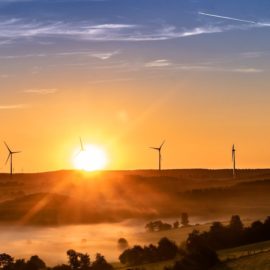
Down under the citizens are smarter than us. They see climate change for what it is, a problem.
Australia sent the democratic world some useful messages in its recent election. The most important: that democracy can stay healthy even when voters are disgruntled, and even when they have problems with the two major parties. Our friends Down Under could do this partly because they have an electoral system that requires everyone to vote and allows voters to cast ballots in a nuanced way. Preferential voting, in which voters rank their choices, means that voters can say more about how they think than a single marking next to one candidate or party can convey. And with turnouts approaching 90%, the will of the people really is the will of the people.
nrtoday.com
They elected one who will help the country and combat climate change.
The headline news is the victory of the Labor Party, led by new Prime Minister Anthony Albanese. Think of Albanese as a 59-year old Joe Biden, a mainstreamer with the common touch and long experience — he’s been in Parliament since he was 33. Albo, as he is known, ran down the middle, even though he began his political life on the left. He is a shrewd negotiator, a careful tactician, and possesses an inner toughness that comes from being raised in what we would call the projects. The son of a single mother on a disability pension, he used his victory speech to express hope that “there are families in public housing watching this tonight” so parents could tell their children that “no matter where you live or where you come from, in Australia the doors of opportunity are open to us all.” The new prime minister has a bit of a chip on his shoulder — “I’ve been underestimated my whole life,” he said at his moment of triumph — but he was not wrong in alluding to doubters. And staunch progressives were unhappy about his no-big-promises “small target” campaign, designed to give his conservative foes as little to shoot at as possible. Albanese correctly calculated that he could win simply by making the increasingly unpopular and divisive incumbent, Scott Morrison, the issue. Morrison headed Australia’s conservative coalition, a long-standing alliance of the Liberal and National Parties. (Yes, the Australian Liberals are the conservatives.)
Strong but realistic they are programs that can be passed. Hopefully he will not have our republicans to contend with.
Labor unexpectedly lost the 2019 election, and party moderates saw a bold list of policies — including strong action against climate change — as the culprit. So Albanese took a more cautious stand in general, and especially on climate. His environmental goals were bolder than Morrison’s, but not so sweeping as to endanger Labor in industrial and mining areas. While Morrison performed well during the pandemic — certainly compared with Donald Trump — his importation of aspects of American-style cultural right-wing politics (his backing of an anti-trans candidate, for example) did not go down well with moderates, including some members of his own party. Many of the dissenters were women. They got their revenge in the Liberal Party’s upper-middle-class suburban heartland as one seat after another fell to a group of female candidates. Financed in the main by corporate figures committed to climate action, they were known as “Teal Independents,” their color a combination of green, for their forceful climate stance, and blue, the color of traditional, pro-business Liberal Party supporters. They will also press the new government for a strong anticorruption commission. The Teal revolution mattered. With several seats still undecided, the Sydney Morning Herald’s count on Tuesday showed Liberals losing 10 seats to Labor, but another six to Independents and one to the Greens. The Greens were the other big winners, taking three seats in the lower House, and they could end up with 12 seats in the Senate.
A big difference is that they have more than two parties including the Green Party which is more visible than ours.
The Green and Teal surge reflected the urgency of the climate issue in Australian metro areas and a revolt against both parties — Morrison for his skepticism about climate action and Albanese for soft-pedaling it. The role of women in this anti-party revolt mattered, too, especially after the uproar created by a devastating 2021 report on a toxic culture of sexual harassment in the Australian Parliament. When all the votes are finally tallied, Labor is likely to have a bare majority of 76 seats (and possibly one more) in the 150-seat House of Representatives. But the two parties were on track for the lowest combined share of first preference votes in history, the Coalition with just under 36% and Labor just under 33%. Labor’s share was depressed by loyalists who backed Teal candidates in seats Labor could never win. But because of a preference system that lets voters back third parties without fear of electing the party they like least, Australians were able to send a message to both major parties that they would like a different kind of politics.
This is more political but that is what EJ Dionne writes about. But the ideas are good ones especially ranked voting.



